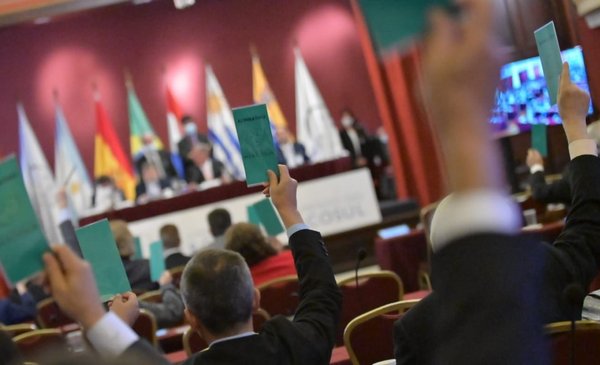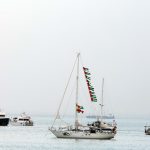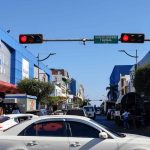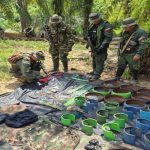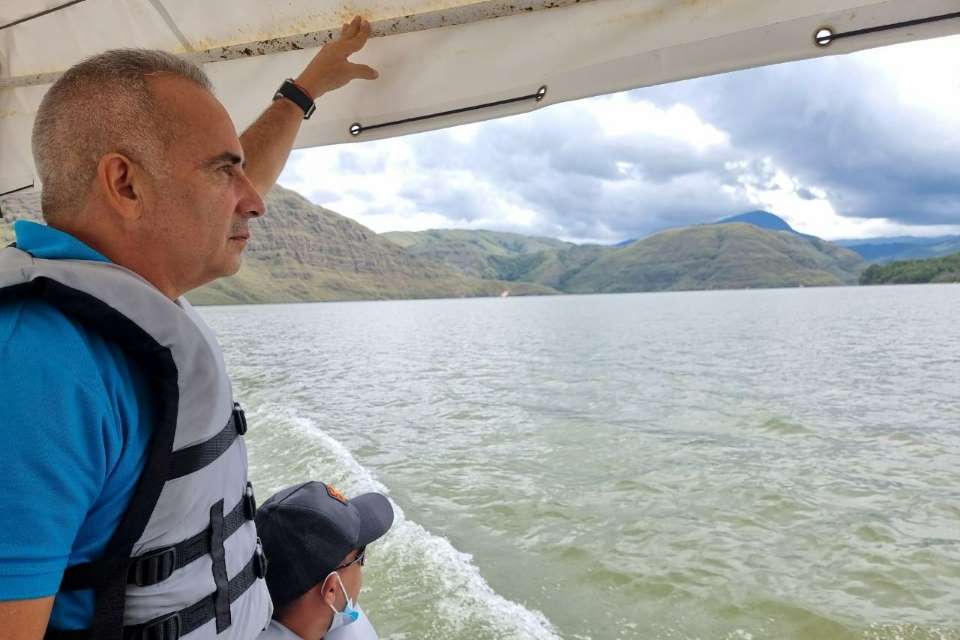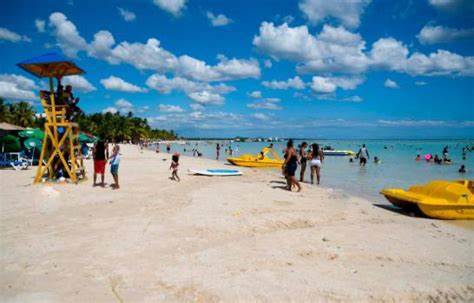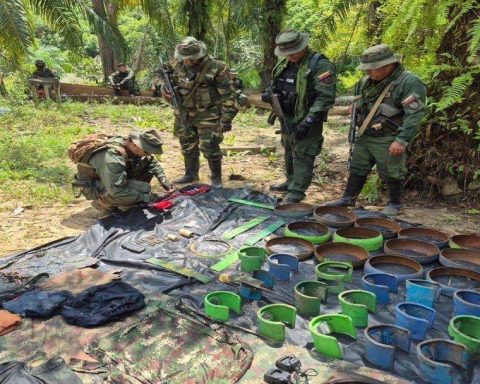The political situation of the Argentine Fabián “Pepín” Rodríguez Simón, former adviser to Mauricio Macri required by the Justice of his country and resident in Uruguay, entered the definition process. In the coming weeks, the Mercosur Parliament (Parlasur), of which he is a member, will decide whether to expel him. The decision has repercussions on this side of the Río de la Plata and the Uruguayan political system appears divided.
Rodríguez Simón is one of those accused in his country in a cause in which the principal implicated is the former president Macri, and in which he investigates an illicit association to extort the shareholders of the Indalo Group, gaming operators in the city of Buenos Aires and owners of a media network, including C5N, Radio 10 and Ámbito Financiero.
For now, his interests will have a temporary setback next Wednesday, when the Budget and Internal Affairs Commission of Parlasur recommends, by majority, his removal. The commission has 10 members. Three of them are Argentines, members of Kirchnerism, who will be adding their vote to that of the two representatives from Paraguay and that of the Uruguayan front player Daniel Caggiani.
In the case of the Paraguayans, as he learned The Observer, They await the reciprocity of the Frente de Todos in the vote to expel their compatriot Celso Troche, who belongs to the National Republican Association (Colorado Party) and whose removal was requested as he was accused of influence peddling for having used his position to gain access to May of last year to the vaccine against covid-19, despite the fact that according to the official scheme it did not correspond.
Rodríguez Simón’s chances will be different in plenary, which willI will have the last word at the end of May. To solve the expulsion, two thirds of the components are needed. There are 124 votes, something that seems impossible to achieve.
Rodríguez Simón, elected to Parlasur in 2015, left his country on December 8, 2020 for Uruguay. The expulsion request had been presented on May 26 of last year by several parliamentarians related to the Argentine front of all. On June 13 of that year, the process formally began.
At the end of September 2021, the former adviser made his discharge remotely before the commission. There he presented a series of reports commissioned to various specialists Uruguayans, who supported his position. Among them is the former Dean of the Faculty of Law of the Catholic University, Martín Risso, and former Foreign Ministers Didier Opertti and Gonzalo Fernández.
Also to the current head of the Human Rights Institute of the Faculty of Law of the University of the Republic, Daoiz Uriarte, who, consulted by The Observer, He maintained that “it is not visualized” that the crimes for which he is claimed in Argentina are clearly defined in the Uruguayan legal system.
Uriarte, former leader of the Broad Front, considered that, without ignoring the existence of a democratic system, in Argentina there was “complex situations” regarding the impartiality of Justice, for which “the conditions would not be met” for him to be extradited. “When in doubt, always in favor of the accused”, he pointed.
Rodríguez Simón alleges that he has suffered an intense “smear and smear campaign” in his country by his accusers, the Indalo Group, since the government of Alberto Fernández took office in Argentina. The responsible: the president himself and the Minister of Security, Aníbal Fernández, who were lawyers for the group, and Vice President Cristina Fernández, a partner in one of his companies.
Macri’s former adviser also appeals in his defense to a host of procedural irregularities in his case, such as the dissemination of almost 11,000 phone calls made by him, with edited content, or the “promiscuous relationship” between officials of the intervening court, operators of the “intelligence services” of Kirchnerism, their denouncers and high-ranking government officials. All this, he affirms, has created in him the “intimate conviction” and “well-founded fears” that he is “persecuted” for his opinions and his political activity.
His defense alluded to the Geneva Convention on Refugee Status of 1951, the corresponding protocol of 1967, the Convention on Territorial Asylum of Caracas and the Uruguayan law on Refuge to benefit from protection in this country. In Argentina, the Justice declared him in absentia, requested his international capture and requested his extradition, aspects that are still in the process of being resolved.
The motion that the Uruguayan ruling party will support, to which it agreed The Observer, points out that no rule or international treaty signed by the country, nor any local law, include as grounds for exclusion from the requested protection that the country of origin of the applicant is a State of Law. There he notices the fact that Macri’s ex-advisor was at no time a “fugitive” from the Justice of his country.
It also appeals to the opinion of several members of the Commission of Jurists of the Argentine Foreign Ministry itself who, in a personal capacity, pointed out that both the primacy of the human right to asylum and the Internal Regulations of Parlasur make the expulsion inadmissible.
Article 10 of the Law of Agreement between Uruguay and Mercosur for the operation of the headquarters of the Mercosur Parliament in Montevideo, ratified in 2008, establishes that “parliamentaries who establish their residence in the territory of the Republic will enjoy the facilities, personal inviolability, immunities, privileges, exemptions and tax exemptions granted to permanent representatives before international organizations based in Uruguay.”
Colorado deputy Conrado Rodríguez pointed out to The Observer that neither is configured “lack of decorum” in the performance of Rodríguez Simón as a Mercosur parliamentarian, as those who demand his expulsion say, for not having presented himself to the request of a Justice on which the person involved claims that he does not offer guarantees. Also that the former adviser is protected by national and international regulations regarding the right to political asylum, ratified by Uruguay and Argentina.
contempt for justice
Front-Among Senator Caggiani (MPP) confirmed to The Observer who will sign the opinion in the commission for the expulsion of Rodríguez Simón. It is discounted that the rest of the representatives of the Uruguayan opposition will do the same in the plenary. In this case, the motion recalls that federal judge María Servini de Cubría declared the accused in absentia, required his arrest by Interpol and that Macri’s former adviser lacks any argument to allege “political persecution.”
“Mr. Rodríguez Simón knew that he should appear in the case that investigated him for the commission of crimes of illicit association, extortion and influence peddling. However, he decided to escape to hinder the investigation until the case is prescribed or some government guarantees him immunity”, is expressed.
In this case, some background is appealed to, including that of José López, a Kirchnerist parliamentarian expelled in 2016 after being prosecuted for corruption in his country. Also that of the well-known leader Milagro Sala who, although she was elected to Parlasur, she was never able to assume as she was previously arrested and convicted.
The motion supported by the Broad Front rejects Rodríguez Simón’s hypothesis by stating that, as of today, “no official or judicial operator” of the Macri government is in preventive detention in Argentina and there are no signs of any upcoming arrest. Also that the political persecution “It cannot be a subjective condition of someone who feels persecuted, but objective situations must concur that make help from a foreign country imminent.” The defendant’s conduct, it is claimed, “reveals a contempt for the Justice of his country once his political party no longer holds public power”, at the same time that it “attempts” against the ethical and moral principles of Parlasur: “integrity, transparency and honesty”.
